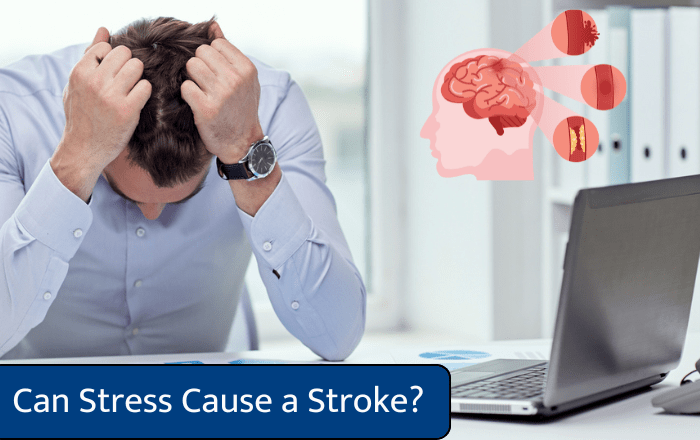Stress has become a part of modern life. Whether it’s work pressure, financial worries, or personal struggles, many people deal with stress daily. But did you know that too much stress can affect your brain and increase the risk of a stroke?
A stroke is a serious condition that happens when blood flow to the brain is blocked or a blood vessel bursts. While many people know that high blood pressure, smoking, and poor diet can lead to a stroke, fewer people realize that stress also plays a big role.
In this blog, we’ll explore how stress affects the brain, how it can lead to a stroke, and what you can do to reduce your risk.
What is a Stroke? Understanding the Basics
A stroke occurs when the brain doesn’t get enough blood, leading to damage in brain cells. There are two main types:
- Ischemic stroke: Caused by a blockage in an artery supplying blood to the brain.
- Hemorrhagic stroke: Happens when a weakened blood vessel in the brain bursts, causing bleeding.
Both types can cause long-term damage, disability, or even death if not treated quickly.
Common Risk Factors for Stroke
Some factors increase the risk of having a stroke, such as:
- High blood pressure
- Diabetes
- High cholesterol
- Smoking
- Heart disease
- Lack of exercise
- Poor diet
But what about stress? Let’s dive deeper into how it connects to stroke risk.
Can Stress Cause a Stroke? What Science Says
When you are stressed, your body releases hormones like cortisol and adrenaline. These hormones help you react to danger, but when stress becomes chronic, they can harm your body in the long run.
How Stress Contributes to Stroke Risk
1. Raises Blood Pressure
Stress can cause temporary spikes in blood pressure. Over time, this can damage blood vessels and increase stroke risk.
2. Triggers Inflammation
Long-term stress can lead to inflammation in the body, making blood vessels less flexible and more prone to blockages.
3. Increases the Risk of Heart Problems
Stress can contribute to conditions like atrial fibrillation (irregular heartbeat), which raises stroke risk.
4. Encourages Unhealthy Habits
When stressed, people often smoke, overeat, or drink alcohol—all of which can contribute to strokes.
Signs of a Stroke: When to Seek Help Immediately
It’s important to recognize the warning signs of a stroke. Use the FAST method to identify symptoms:
F – Face Drooping: One side of the face looks uneven or droops.
A – Arm Weakness: One arm is weaker than the other and drifts downward.
S – Speech Difficulty: Slurred speech or trouble speaking clearly.
T – Time to Call Emergency: If you notice any of these signs, call for medical help immediately.
Other symptoms include:
- Sudden severe headache
- Vision problems
- Dizziness or loss of balance
A stroke is a medical emergency, and quick treatment can save a life.
How to Reduce Stress and Lower Your Stroke Risk
Managing stress effectively can help protect your heart and brain. Here are some simple ways to keep stress levels in check:
1. Practice Deep Breathing and Meditation
Taking a few minutes daily to breathe deeply or meditate can help lower stress hormones.
2. Exercise Regularly
Physical activity releases endorphins, which improve mood and reduce stress. Try activities like walking, yoga, or dancing.
3. Eat a Healthy Diet
Eating more fruits, vegetables, and whole grains helps reduce the impact of stress on your body. Avoid processed foods, excessive caffeine, and sugary snacks.
4. Get Enough Sleep
Poor sleep increases stress levels. Aim for 7–8 hours of sleep each night to keep your brain and heart healthy.
5. Connect with Loved Ones
Talking to friends and family can reduce stress and improve emotional well-being.
6. Seek Professional Help if Needed
If stress feels overwhelming, consider speaking to a mental health professional or a doctor.
Dr. Ninad Patil on Stroke Prevention & Treatment
Dr. Ninad Patil, a well-known brain surgeon in Pune, has helped many patients recover from strokes and offers guidance on prevention. He advises regular health checkups and managing risk factors like high blood pressure, diabetes, and stress.
If you have concerns about your stroke risk or symptoms, scheduling a consultation can help you understand your condition better.
Take Control of Your Health
While stress alone may not directly cause a stroke, it can contribute to several risk factors that increase the chances of having one. The good news is that managing stress, maintaining a healthy lifestyle, and seeking medical guidance can help lower your risk.
If you’re worried about stress affecting your health, take action today.
Frequently Asked Questions (FAQs)
1. Can emotional stress cause a mini-stroke?
Yes, stress can trigger a transient ischemic attack (TIA), often called a mini-stroke. While TIAs don’t cause permanent damage, they are a warning sign of a future stroke.
2. What foods help reduce stroke risk?
Leafy greens, berries, nuts, fish rich in omega-3, and whole grains can help improve heart and brain health.
3. What are the first symptoms of a stress-related stroke?
The symptoms of a stress-induced stroke are the same as other strokes—sudden weakness, slurred speech, confusion, or difficulty walking.
Book an appointment with Dr. Ninad Patil – Brain Surgeon in Pune
For expert guidance on stroke prevention and treatment, reach out today. Taking the right steps now can protect your brain and overall health.



